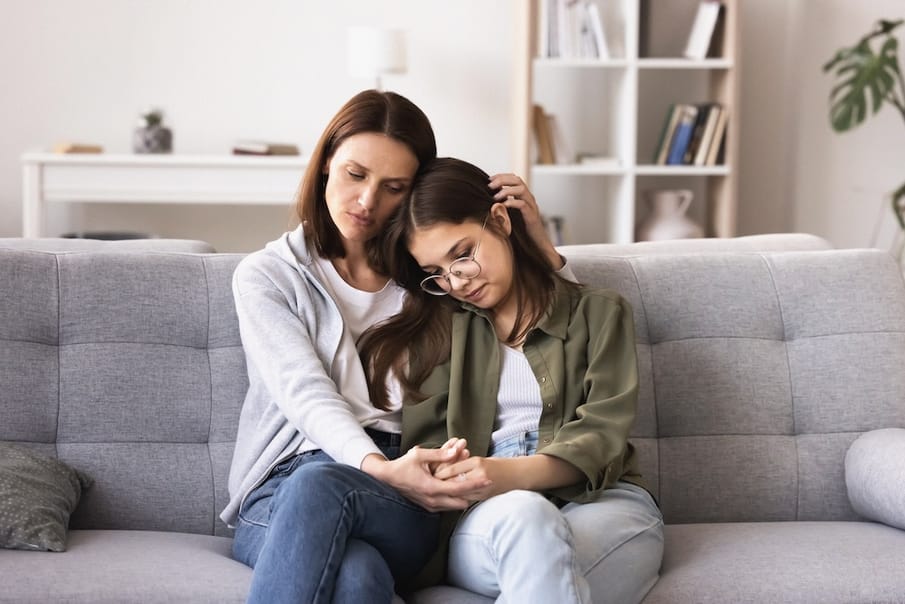Approaching conversations about adolescent romances can be tricky, but the payoff is worth it. So, how do you begin when it comes to talking to teens about having healthy relationships?
At an age where they’re gaining independence and exploring more of the world on their own, ensuring teenagers know the difference between a healthy and unhealthy relationship is vital. While it can be difficult and feel a little embarrassing to broach these kinds of conversations with the young people in our lives, they are essential in helping them gain awareness, set boundaries, and stay safe.
The Office for National Statistics reports that 25% of women experience some form of abuse before the age of 16. That’s an estimated 5.1 million women in the UK. That said, while it’s important to note that girls are disproportionately affected by abuse, it is also vital to have these conversations with boys. So, when the time comes, here are some suggestions on how to navigate those conversations.
Create a safe space to talk, without judgement
If you’re going to encourage your kids to be receptive to these kinds of conversations, it is key that you remain open-minded and non-judgemental if they tell you something worrying. Listen calmly to what is being said, and give them time and space to explain, showing them that they are being heard and that their views are important. Try to see things from their perspective, respect their privacy, and allow them to open up in their own time and pace.
Use conversation starters
Don’t know how to bring the topic up? Here are some suggestions to get the conversation going.
If you’re a parent or carer who doesn’t have a particularly open relationship with the kids in your life, then go in ‘softly’ to start with. Try: “Is everything OK with you and your friends? They haven’t been around here for a while/You haven’t talked about them in a while.” Or: “How does your boyfriend/girlfriend get on with your friends?” Or: “You haven’t seemed yourself lately, is there something on your mind?”
Then, when you feel like the barriers have come down a little, you can ask deeper questions. These might include: “Do you feel you can be yourself with your boyfriend/girlfriend?” Or: “Do you ever feel pressured to do things you don’t want to?” Or: “Do you feel you understand consent and boundaries?”
Establish whether they know the signs of abuse
A good way to gauge how much a young person knows about what a healthy relationship looks like is to ask how they would characterise it. Descriptions that show their understanding might include: “Treating each other as equals,” “Having healthy boundaries,” “Enjoying personal time away from each other,” or “Not putting pressure on each other.”
Then do the same with ‘red flags’ in a relationship. They may be able to identify some, including: “Trying to control behaviour,” “Not trusting each other,” “Being pressured into doing particular things/activities,” and “Trying to isolate you from friends.”
If they aren’t able to bring anything to mind when you ask these questions, you could bring up these examples as prompts to discuss.
Talk about consent
Deciding when to have sex, either for the first time or not, is an important choice. But, when you’re young, it’s so easy to be influenced by peers or a partner. Research by domestic abuse charity Advance found that 73% of young women and girls wished they had known more about consent, and how to say no, when they started having sexual experiences.
“I think if I would have known a bit more about it, and a bit more about the feelings and emotions that come with it, then maybe I would have waited,” said one girl who took part in the research.
It’s important for young people to know that giving consent doesn’t mean it’s an ongoing ‘yes’, and that consent can be withdrawn at any point. It’s also important to give them the ways in which they resist any pressure on them to have sex. For example:
- Being assertive and confident when saying ‘no’.
- Voicing how you feel when someone is pressuring you.
- Suggesting something else to do.
As with other topics, explore what they know already, and explain these key points to them where needed.
Encourage self-inquiry
It’s important to gently challenge anything you might hear your teen or young person say that rings a bit of an alarm bell with you, or even triggers you to want to immediately ban them from using their phone/social media/seeing someone!
You can do this by saying: “Where did you hear that? That’s an interesting perspective. Have you thought about looking at it another way?” Or: “What do your friends think about that?” It’s a good way to get them to not just passively absorb the information that they can be bombarded with on social media, but to approach that information with some self-inquiry.
There’s no doubt that having these conversations is tough. If you’re struggling to pluck up the courage to talk to your kids about these intimate subjects, it might help to remember this: teenagers can be empowered in their relationships when they learn how to identify the early warning signs of abuse, understand the choices available to them, and know they deserve to be treated with respect. So, push through the discomfort if you can, it could be life-changing.


Comments